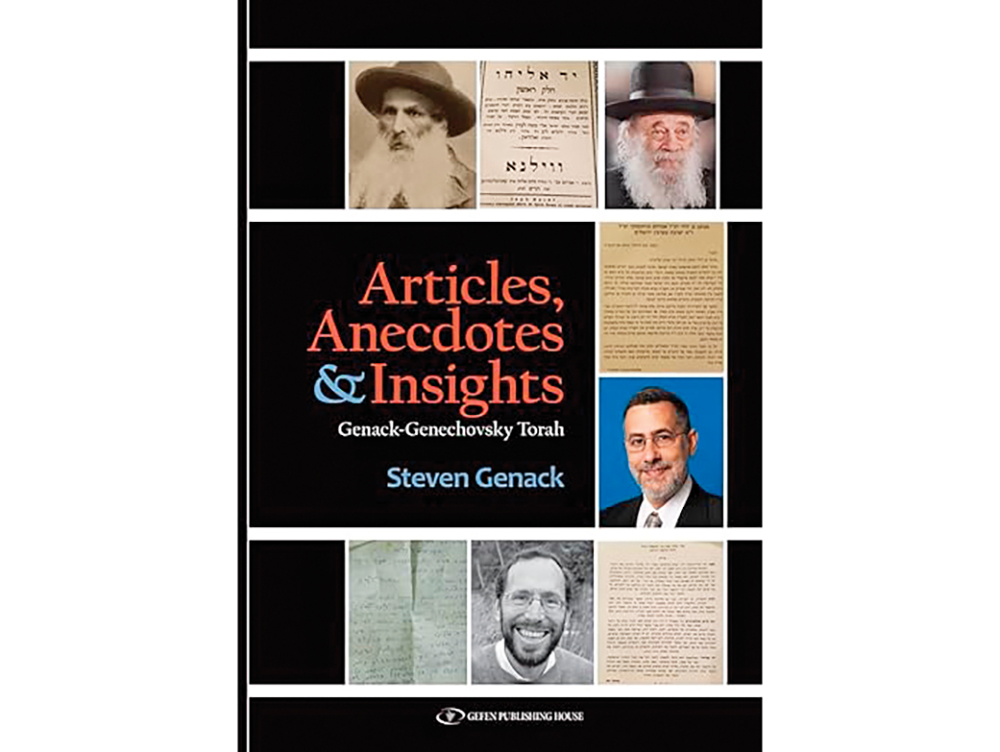
Reviewing: “Articles, Anecdotes & Insights: Genack/Genechovsky Torah” by Steven Genack. Independently published. 2023. English. Paperback. 172 pages. ISBN-13: 979-8323969159.
When looking at the cover of Articles, Anecdotes & Insights: Genack-Genechovsky Torah (Gefen Publishing), the verse in Koheles 4:12, “A threefold cord is not readily broken,” comes to mind. On the cover are four generations of Genack/Genechovsky clan family members whose Torah continues to be disseminated.
In this insightful and original read, my friend Steven Genack has gathered Torah insights and more from his illustrious family. The four generations the book covers are: his great-great-grandfather Rabbi Eliyahu Moshe Levine (Levine being the original last name of Genechovsky, which later became Genack), Rabbi Avroham Genechovsky, Rabbi Menachem Genack and Rabbi Dr. Yakov Nagen (who changed his name from Genack).
Just as Torah is not monolithic, the Torah from these four personalities is quite dynamic. Rabbis Levine and Genechovsky are old-school Israeli Haredi. American-born Rabbi Menachem Genack is one of the closest students of Rabbi Joseph B. Soloveitchik and brings to these pages the deep Brisker analysis of Rav Soloveitchik. The Manhattan-born and bred Yakov Nagen, now residing in Israel, brings a very contemporary approach.
Much of the book is dedicated to insights from Rabbi Avroham Genechovsky. While not necessarily well-known to Americans, he was a prominent rabbinic figure in Israel, as someone close to greats such as the Chazon Ish and the Tchebiner Rav, Rabbi Dov Berish Weidenfeld. The author also shares many insights from Rav Avroham during his extended stays with him in Israel.
Many rabbinic families’ learning and methodology are somewhat static. What is unique about these four personalities is the dynamic nature of their teachings. Rabbis Levine and Genechovsky bring a traditional yeshiva approach.
Rabbi Genack’s insights here are straight out of Brisk, from Rav Soloveitchik’s Bais Medrash. The young Rabbi Dr. Nagen comes full circle with a much more modern, neo-Chasidic approach.
Rabbi Avroham Genechovsky was not just a great Talmudic scholar but also a man of deep and sophisticated insights. One particularly perceptive thought shared in the book is based on the Gemara at the beginning of Kidushin, which states that whenever the word derech is used, it connotes argument. And whenever the word davar is used, there is no connotation of argument. He says there is a powerful message here—if we insist that everything be our way, then an argument will automatically ensure.
The book concludes with another insightful comment from Rav Avroham and it’s worth getting the book just for this. Based on the verse in Bamidbar 5:10, “And each shall retain his sacred donations— each priest shall keep what is given to him,” he says that the end of the verse further says that whatever we give as tzedakah also will be ours forever. And that the only money that we own is the tzedakah we give.
At death, everything else evaporates and will not enter the next world with us to offer merit on our behalf. Knowing that only Torah, mitzvos and gemilus chasidim escort us into the next world and that we only own tzedakah— our mission in this world is simplified.
The book is titled Articles, Anecdotes & Insights. But it can really be more accurately titled, Articles, Anecdotes,& Very Original Insights. And there’s a lot to like in this book.
Ben Rothke lives in New Jersey and works in the information security field. He reviews books on religion, technology, philosophy and science. Follow him on Twitter at @benrothke. His new book was recently published: ”The Definitive Guide to PCI DSS Version 4: Documentation, Compliance, and Management.”












